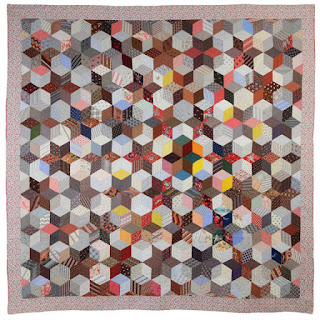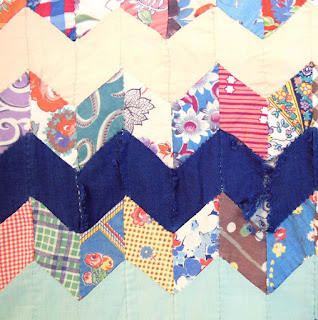Charm quilt from Stella Rubin's online quilt shop
About 1870-1900
Some of the most beautiful charm quilts are made of parallelograms.
Annabella Milbanke, Lady Byron
I'm stuck in the world of tesselating parallelograms.
Sort of like the mathematically-minded Lady Byron whose unpleasant husband called her the Princess of Parallelograms. Was that an insult or a compliment?
I'm taking it as a compliment.
Detail of a quilt from Ann Wasserman's collection
Diamonds with 60 degree angles are versatile parallelograms.
Quilt about 1870-1900
BlockBase #142a
Variegated Diamonds according to the Ladies' Art Company about 1898
They can be shaded to look like cubes or blocks...
stars...
About 1900
BlockBase 142d
or stars and cubes.
Detail of Stella Rubin's vintage quilt
6-pointed stars...
BlockBase # 143a
Quilt about 1870-1900 from Marie Mueller's shop.
A very versatile shape.
About 1890-1925
You can stack them too
About 1940-60
About 1840-60
From Laura Fisher's online shop
Two other stacking and shading ideas:
BlockBase 141 a & b.
One piece arranged like a star but
shaded to make a pinwheel
The other common parallelogram we use is cut with 45 degree angles.
It's the one used for an 8-pointed star
It isn't as versatile as the 60 degree diamond.
There just aren't as many ways this diamond will tessellate
You can stack them and they will tessellate all the way to the
edge, with just a little chopping to get them squared up.
You can make them into an 8-pointed star
but
Collection of the Brooklyn Museum
You have to work to get the edges to resolve
It is possible to resolve the edges.
But I have never been tempted.
Here's a parallelogram that is not in BlockBase.
I guess I never saw it published with a name.
Some vintage examples, above about 1900;
Below about 1880
Stacking seems to be the option.
A similar look from Laura Fisher's online shop
You can get the same look with triangles and it might be easier.
These tessellation puzzles are totally addicting.










































































